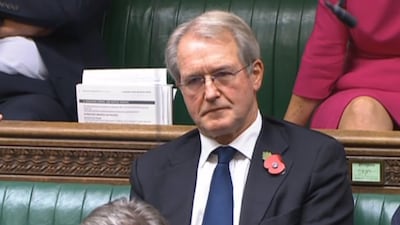The British MP at the centre of a lobbying scandal resigned on Thursday after a U-turn by Boris Johnson’s government cleared the way for a new vote on his suspension.
The decision by Owen Paterson is the latest blow to the government, which has been rocked by claims of corruption and sleaze for trying to rewrite the rule book on MPs’ behaviour to protect the former minister.
The government successfully ordered its MPs to block a six-week suspension for Mr Paterson, who was censured by a parliamentary watchdog for lobbying on behalf of companies which paid him more than £100,000.
But a backlash against plans for a new standards system prompted the government to draw back from its plans and promise a new vote on Mr Paterson.
The MP responded by announcing that he would quit after describing the last two years as an “indescribable nightmare” and claiming he had been unable to clear his name under the current system.
He said the pressure of the inquiry — which concluded he was responsible for an “egregious” breach of the rules — contributed to his wife’s suicide in June last year.
“I maintain that I am totally innocent of what I have been accused of and I acted at all times in the interests of public health and safety,” he said in a statement.
“The last few days have been intolerable for us. Worst of all was seeing people, including MPs, publicly mock and deride Rose's death and belittle our pain.
“My children have therefore asked me to leave politics altogether, for my sake as well as theirs.
“I agree with them. I do not want my wife's memory and reputation to become a political football.”
The government’s alternative system of oversight ran into immediate problems after opposition parties vowed to boycott the project and the current watchdog, Kathryn Stone — whose position was thrown into doubt — vowed to stay in post until the end of her term in December 2022.
The move was condemned by opposition MPs, anti-corruption groups and within the prime minister’s own party.
The dispute was further stoked on Thursday by Business Secretary Kwasi Kwarteng, who suggested that Ms Stone, the independent parliamentary commissioner for standards, should quit before her five-year term finishes.
“I think it's difficult to see what the future of the commissioner is, given the fact that we're reviewing the process, and we're overturning and trying to reform this whole process, but it's up to the commissioner to decide her position,” he told Sky News.
The Labour Party accused Mr Kwarteng of trying to bully her out of her post following her damning criticisms of Mr Paterson’s conduct.
The backlash forced the government into a rapid rethink and it announced that the plans would be delayed to allow for further discussions. One ruling party MP on the lowest rung of the ministerial ladder who had voted against the plans was reinstated.
Opposition leader Sir Keir Starmer — who, as the country’s chief prosecutor, brought cases against MPs who abused the expenses system a decade ago — had described the planned changes as corruption.
“That the Tories are yet again wallowing in sleaze comes as no surprise,” wrote Mr Starmer in The Guardian newspaper.
The Business Insider website revealed that 22 ruling party MPs who backed the move to scrap the current system were either under investigation or had been censured by the commissioner since 2019.
Lord Evans, the chairman of the Committee on Standards in Public Life, described plans for a Tory-led review into the disciplinary process for MPs as being “deeply at odds with the best traditions of British democracy”.
The former MI5 chief told an Institute for Government event: “It cannot be right to propose an overhaul of the entire regulatory system in order to postpone or prevent sanctions in a very serious case of paid lobbying by an MP.
“And it cannot be right to propose that the standards system in the House of Commons should be reviewed by a select committee chaired by a member of the ruling party and with a majority of members from that same party.
“This extraordinary proposal is deeply at odds with the best traditions of British democracy.
“The political system in this country does not belong to one party or even to one government — it is a common good that we have all inherited from our forebears and that we all have a responsibility to preserve and to improve.”
The Conservative party has been dogged by the issue of “sleaze” since former premier John Major announced a “back to basics” policy in 1993 promoting traditional values — but this became a derided slogan after a series of sexual and financial scandals.
The leak in 2009 of expenses and allowances claimed by MPs — including payments for a “duck island” and mortgage scams — led to prosecutions and forced a number of MPs from across the political spectrum to announce they were leaving front-line politics.


